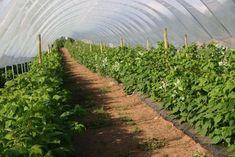
When KG Fruits, the UK’s largest grower marketing group, in association with world-renowned California breeder Driscoll, hit the jackpot with Jubilee, it was a wonderful start for an association begun in 1997.
Driscoll’s was looking to extend its influence into the European market, supplying its registered top tasting varieties whose plants could adapt well to local conditions. So it came to the UK to look for partners to set up trials.
“Under the arrangement Driscoll’s selects possible varieties for evaluation which if successful lead to full-scale production,” explains Nicholas Marston, KG’s managing director.
“We saw this as a tremendous opportunity to move the industry forward at a time when there were few really successful European newcomers, while the general quality of US fruit had undergone a radical improvement since the 1960s.
Driscoll’s, which can trace its history back 50 years earlier and is one of the best-known names in the US packing under is own name, has been concentrating not just on providing well-coloured, heart-shaped berries but also on the organoleptic virtues of the fruit.
“At the same time UK supermarkets were becoming more and more preoccupied with this vital attribute to expand an already increasing business.”
In the first stages KG Fruits helped select three everbearing strawberry varieties - Alta Vista, Alpujarra (which was dropped after the initial trial), and Baeza.
Under the terms of the agreement Driscoll’s continued to own the trade-marked plants grown on plots hired from KG Fruits’ members. It receives a royalty from sales.
The initial choice process still remains complex.
Thousands of plants are raised from seed produced in the US and then grown on in a UK test plot. The plants are split into their respective family groups and the resulting progeny can differ widely.
Through this, the partnership is able to identify possible commercial varieties, as well as material that may only be suitable for becoming a future parent. Further crossing and re-crossing takes place, creating potential combinations that continually refines the germplasm until a potential commercial variety is found.
The vast majority of crosses are discarded along the way in the search for perfection, not only in terms of taste, shape, colour and shelf life, but the ability to produce a commercial yield that offers profit potential.
In west Kent, trials of Jubilee - as it become identified when it dropped its code number - paid off. Launched in Millennium year it was heralded by Marks & Spencer, which was given an initial period of exclusivity, as the best strawberry it had ever sold.
This opinion was backed up by recognition through awards in open competition at several major UK fruit shows.
But Marston is quick to point out that the ongoing trials should not be seen as an American invasion. Indeed, he points out that many of the best-known strawberries grown throughout Europe such as Camarosa, can trace their ancestry back to the Californian industry.
KG Fruits has initially concentrated on the post-June period when everbearers take the helm. But the focus has switched. “We are now looking at the potential in the early part of the season to match Elsanta which is still the Dutch-bred industry standard,” says Marston. “It’s good fruit so it will be quite a challenge.”
But he is confident that change will come. “There has been a step-change by breeders to concentrate on bespoke varieties, including those which fulfil a specific purpose as the berry fruit sector continues to segment and the market grows more mature,” Marston says.
Examples of this are already seen on the shelves and include “dipping” strawberries with long stems imported by KG Fruits from Driscoll’s Californian production. “There is potential to provide fresh fruit for the foodservice industry in whole and sliced formats,” he says.
US know-how is also being harnessed to enhance other berry sub-categories. In 2002 KG Fruits extended its portfolio to raspberries, although Richard Harnden, KG technical director, says the selection of potential winners takes far longer compared with strawberries which are planted out annually, because canes need more than a year to show their potential.
“The process to reach the first commercial quantities of fruit through multiplying the chosen varieties can still take at least five years,” says Harnden.
But with the retail demand for UK produced raspberries increasing annually linked to production methods that allow for an extended season, volume growth potential is huge.
“Many of the new US strains appeal not just because they taste exceptionally good but also because berry size is larger and slightly paler so the fruit does not look if it is over mature,” explains Harnden.
Some 10 per cent of KG Fruit’s UK production is based on new Driscoll’s varieties, which Marston says will rapidly increase to 20 per cent plus, and eventually become the major part of the company’s year round offer.
The 12-month offer of Driscoll’s varieties takes into account KG and Driscoll’s global procurement from sources such as North America and Mexico.
It also encompasses Spanish and Portuguese imports outside the English season, for which the group has a strategic alliance with Spain-based grower/exporter Alconeras. The Spanish company has its own, similar arrangement with Driscoll’s, and its own UK-based marketing operation, Alconera UK.



